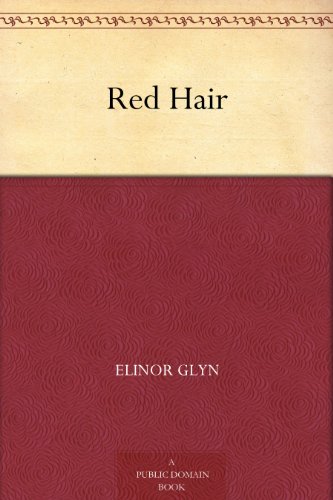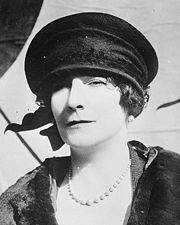
An excerpt from the introductory: "Branches Park, November 3. I wonder so much if it is amusing to be an adventuress, because that is evidently what I shall become now. I read in a book all about it; it is being nice looking and having nothing to live on, and getting a pleasant time out of life?and I intend to do that! I have certainly nothing to live on, for one cannot count £300 a year; and I am extremely pretty, and I know it quite well, and how to do my hair, and put on my hats, and those things?so, of course, I am an adventuress! I was not intended for this r?le?in fact, Mrs. Carruthers adopted me on purpose to leave me her fortune, as at that time she had quarrelled with her heir, who was bound to get the place. Then she was so inconsequent as not to make a proper will thus it is that this creature gets everything, and I nothing! I am twenty, and up to the week before last, when Mrs. Carruthers got ill and died in one day, I had had a fairly decent time at odd moments when she was in a good temper. There is no use pretending even when people are dead, if one is writing down one's real thoughts. I detested Mrs. Carruthers most of the time. A person whom it was impossible to please. She had no idea of justice, or of anything but her own comfort, and what amount of pleasure other people could contribute to her day. How she came to do anything for me at all was because she had been in love with papa, and when he married poor mamma?a person of no family?and then died, she offered to take me, and bring me up, just to spite mamma, she has often told me. As I was only four I had no say in the matter, and if mamma liked to give me up that was her affair. Mamma's father was a lord, and her mother I don't know who, and they had not worried to get married, so that is how it is poor mamma came to have no relations. After papa was dead, she married an Indian officer and went off to India, and died, too, and I never saw her any more?so there it is; there is not a soul in the world who matters to me, or I to them, so I can't help being an adventuress, and thinking only of myself, can I? Mrs. Carruthers periodically quarrelled with all the neighbors, so beyond frigid calls now and then in a friendly interval, we never saw them much. Several old, worldly ladies used to come and stay, but I liked none of them, and I have no young friends. When it is getting dark, and I am up here alone, I often wonder what it would be like if I had?but I believe I am the kind of cat that would not have got on with them too nicely?so perhaps it is just as well. Only, to have had a pretty?aunt, say?to love one?that might have been nice. Mrs. Carruthers had no feelings like this; "stuff and nonsense," "sentimental rubbish," she would have called them. To get a suitable husband is what she brought me up for, she said, and for the last years had arranged that I should marry her detested heir, Christopher Carruthers, as I should have the money and he the place. He is a diplomat, and lives in Paris, and Russia, and amusing places like that, so he does not often come to England. I have never seen him. He is quite old?over thirty?and has hair turning gray. Now he is master here, and I must leave?unless he proposes to marry me at our meeting this afternoon, which he probably won't do. However, there can be no harm in my making myself look as attractive as possible under the circumstances ..."
Author

Elinor Sutherland was born in St Helier, Jersey, the younger daughter of Douglas Sutherland (1838–1865), a civil engineer of Scottish descent, and his wife Elinor Saunders (1841–1937). Her father died when Elinor was two months old and her mother returned to the parental home in Guelph, Ontario, Canada with her two daughters, Lucy Christiana and Elinor. Back in Canada, Elinor was schooled by her grandmother, Lucy Anne Saunders, in the ways of upper-class society. This early training not only gave her an entrée into aristocratic circles on her return to Europe, but it led to her being considered an authority on style and breeding when she worked in Hollywood in the 1920s. Her mother remarried a Mr. Kennedy in 1871 and when Elinor was eight years old the family returned to Jersey. When there her schooling continued at home with a succession of governesses. Elinor married Clayton Louis Glyn (1857–1915), a wealthy but spendthrift landowner, on 27 April 1892. The couple had two daughters, Margot and Juliet, but the marriage apparently foundered on mutual incompatibility although the couple remained together. As a consequence Elinor had affairs with a succession of British aristocrats and some of her books are supposedly based on her various affairs, such as 'Three Weeks' (1907), allegedly inspired by her affair with Lord Alistair Innes Ker. That affair caused quite a furore and scandalized Edwardian society and one of the scenes in the book had one unnamed poet writing, Would you like to sin With Elinor Glyn On a tiger skin? Or would you prefer To err with her On some other fur? She had began her writing in 1900, starting with a book based on letters to her mother, 'The Visits of Elizabeth'. And thereafter she more or less wrote one book each year to keep the wolf from the door, as her husband was debt-ridden from 1908, and also to keep up her standard of living. After several years of illness her husband died in 1915. Early in her writing career she was recognised as one of the pioneers of what could be called erotic fiction, although not by modern-day standards, and she coined the use of the world 'It' to mean at the time sex-appeal and she helped to make Clara Bow a star by the use of the sobriquet for her of 'The It Girl'. On the strength of her reputation and success she moved to Hollywood in 1920 and in 1921 was featured as one of the famous personalities in a Ralph Barton cartoon drawn especially for 'Vanity Fair' magazine. A number of her books were made into films, most notably 'Beyond the Rocks' (1906), which starred Rudolph Valentino and Gloria Swanson, and she was a scriptwriter for the silent movie industry, working for both MGM and Paramount Pictures in the mid-1920s. In addition she also had a brief career as one of the earliest female directors. In 1927, by which time she had published 32 novels, she once again appeared in some verse of the day. Songsmith Lorenz Hart immortalised her in his song 'My Heart Stood Still' when he wrote, I read my Plato Love, I thought a sin But since your kiss I'm reading missus Glyn! She was so universally popular and well-known in the 1920s that she even made a cameo appearance as herself in the 1928 film 'Show People'. As well as her novels, she wrote wrote magazine articles for the Hearst Press giving advice on 'how to keep your man' and also giving health and beauty tips. In 1922 she published 'The Elinor Glyn System of Writing', which gives an insight into writing for Hollywood studios and magazine editors. In later life she moved to the United Kingdom, settling in London. She wrote over 40 books, the last of which was 'The Third Eye' (1940) and she died in Chelsea on 23 September 1943, being survived by her two daughters. Gerry Wolstenholme November 2010